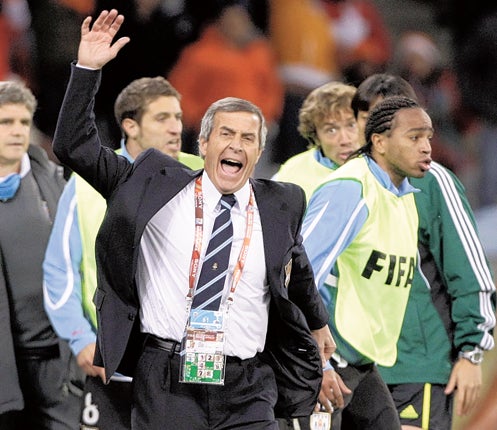Lack of resources puts Uruguay's place among elite under threat

Uruguay's performance in reaching the last four at the World Cup has been an extraordinary struggle against the odds and keeping the tiny country among soccer's elite could prove even more difficult.
In fact, it is quite possible that Uruguay, beaten 3-2 by Netherlands in Tuesday's semi-final, might not even qualify for the next World Cup in neighbouring Brazil in 2014 given the difficulties they face. Some pundits have sneered at Uruguay, pointing out that they beat Ghana in the quarter-finals after Luis Suarez stopped a goal-bound shot with his hand on the line, but there has been much to admire as they hugely exceeded expectations.
Although Uruguay won the World Cup twice back in the early days of the tournament in 1930 and 1950, the country today can barely support a professional league. Few first division matches attract more than a couple of thousand fans and many of the stadiums would not be considered fit for even semi-professional football in many European countries.
Peñarol and Nacional, who once dominated the South American Libertadores Cup, are no longer feared on the continent and Uruguayan clubs won the last of their eight titles back in 1988. The only way out for most young Uruguayan players is the airport. The lucky few end up in Europe but the country also exports dozens to Mexico, Argentina, Chile, Peru and Colombia.
Coach Oscar Tabarez, who also led the Celeste to the second round at the 1990 World Cup, sees his players only a few times a year and has warned frequently that the differences between countries such as Uruguay and rich European nations are growing.
He says that European countries are snapping up Uruguayan players at an ever-younger age, sometimes in their mid-teens, and although the country produces players at an impressive rate, it does not have the chance to develop them. Before Tuesday's game, a philosophical Tabarez said it would be impossible for Uruguay to stay among the elite, even if they won the World Cup.
"It would be utopian to think of Uruguay's permanence at the summit... but we can believe in circumstantial results," he said.
Uruguay played a major role in turning football into an international sport, winning the 1924 and 1928 Olympic tournaments with a short-passing game which had never been seen before in Europe.
They also hosted and won the first World Cup tournament in 1930 at the Centenario stadium which is still used for their home games. After winning again in 1950, other larger nations equalled their technical ability and, with such a small population, they fell behind. At one stage, they became synonymous with rough play and gamesmanship, something which Tabarez and his immediate predecessors have worked hard to wipe out. They completed two games in South Africa without receiving a single yellow card.
"We have worked with respect, humility and a belief in long-term projects and we have seen the reflection in the result," Sebastian Abreu said after the game. "It has been very positive for our country. Other teams would have thrown in the towel and raised the white flag, but we didn't."
Uruguay almost missed out on South Africa altogether. They faced elimination when they trailed 1-0 to Ecuador at altitude in their penultimate qualifier but hit back to win 2-1. That earned them a playoff against Costa Rica where they scraped through 2-1 on aggregate to qualify for only the second time since 1990.
With competition in South America so intense, just getting to Brazil in four years time will once again be a huge challenge.
"The qualifiers are torture, the finals are a party," said Tabarez.
Uruguay's World Cup adventure lasted longer than expected, but the disappointment of defeat was still hard to bear. Thousands of football fans crammed around giant screens in Montevideo to watch.
Fans were dreaming of a return to the glory years of 1930 and 1950 when Uruguay won the competition.
The Uruguayan president Jose Mujica said the match should have lasted five minutes longer because "we were winning it."
Watching the game on a giant screen installed at a theatre in the centre of Montevideo, Mujica said "we lost, but with lots of dignity."
In the end, the 3-2 loss in Cape Town punctured the euphoria, though fireworks were released and a half-hearted chorus of "soy celeste" – "I'm a sky blue," as the national team is known – was heard as fans acknowledged their team's efforts. A few partygoers stayed on in the city centre until the early hours of the morning with a few minor disturbances reported.
As defeat began to sink in, most fans made their way home quietly as a sombre atmosphere replaced the chanting and dancing.
Luis Mendoza, coordinator of the security operation mounted by Montevideo police, said "around 15 people were detained, after drinking alcohol, for causing disorder."
"The dream is over," said Oscar Umpierrez, a newspaper and magazine stall owner, who closed his business for 90 minutes before the match.
The sports minister Hector Lecano said there were plans for a big celebration to welcome the team back to Uruguay on Monday, after the third-place play-off.
Subscribe to Independent Premium to bookmark this article
Want to bookmark your favourite articles and stories to read or reference later? Start your Independent Premium subscription today.

Join our commenting forum
Join thought-provoking conversations, follow other Independent readers and see their replies